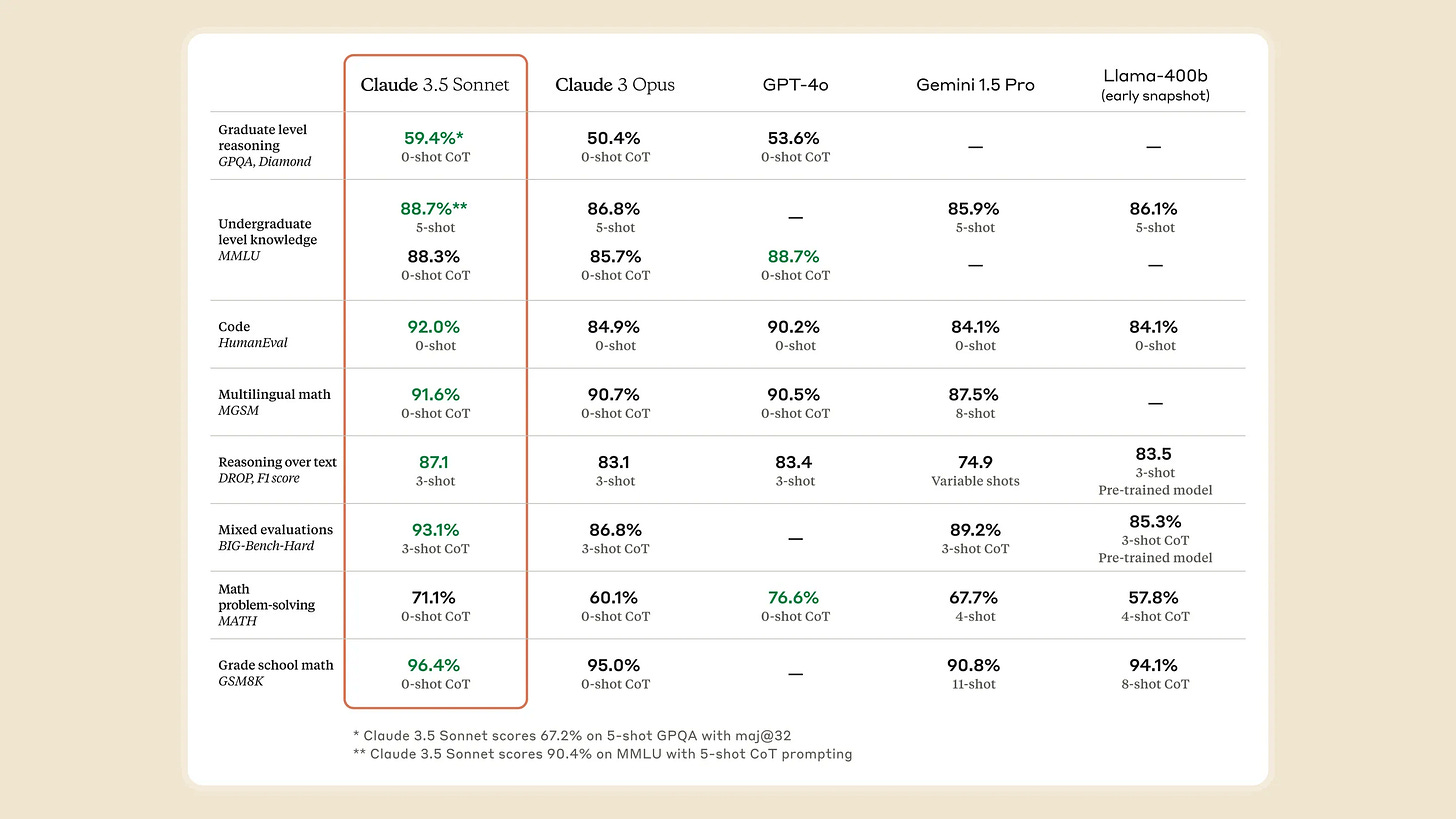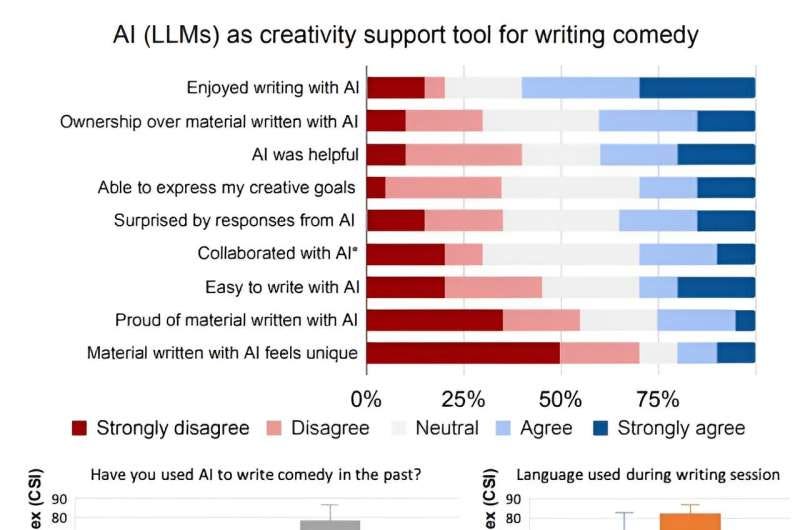Claude 3.5 Sonnet, Sutskever's Startup, AI in Comedy, and Adobe's AI Features
PLUS HOT AI Tools & Tutorials
Hello and welcome to our weekly digest!
The week is coming to an end, which means we've got new models, startups, and updates to discuss. And while we're talking about many important news today, my personal favorite is DeepMind's experiment in using AI to come up with standup jokes.
After all, this research offers hope that AI won't leave us completely out of work.
We responsibly declare: AI is not for fun.
If you want to understand why this is so, and at the same time figure out how to build a business based on LLMs in 2024, this post is for you:
This Creators’ AI Edition:
Featured Materials 🎟️
News of the week 🌍
Useful tools ⚒️
Weekly Guides 📕
AI Meme of the Week 🤡
AI Tweet of the Week 🐦
(Bonus) Materials 🎁
Featured Material 🎟️
Anthropic Releases Claude 3.5 Sonnet
The new AI from Anthropic is called Claude 3.5 Sonnet. This model is faster than the previous Claude 3 Opus and is the first member of the new Claude 3.5 family. Anthropic says Claude 3.5 Sonnet can equal or even surpass OpenAI GPT-4o or Google Gemini in a wide range of tasks.
Let's take a look at what it has to offer.
Benchmark Results
Traditionally, each new model from a leading developer is vastly superior to its predecessors and solutions from competitors. Claude 3.5 Sonnet is no exception. As you can see in the image below, the AI beats everyone, including GPT-4o, in almost any task.
As the company itself states, Claude 3.5 Sonnet sets new standards for graduate-level thinking (GPQA), undergraduate-level knowledge (MMLU), and programming skills (HumanEval). The AI has also shown marked improvement in understanding nuance, humor, and complex instructions and writes articles well with a natural tone.
And I'll just remind you that such synthetic tests have little to do with reality. First, they do not always reflect the demands of real users. And secondly, these ratings change so quickly that I don't see the point in focusing serious attention on them. Nevertheless, the performance of Anthropic's new model hints that it's really good.
Keep your mailbox updated with key knowledge & news from the AI industry
More importantly, at the same time as the launch of the Claude 3.5 Sonnet, the company showed off a feature called "Artifacts." With it, users can interact with queries in Claude in a new way. Technically, this means that Claude now works as a handy editor.
You can try it now.
Claude 3.5 Sonnet is already available on Claude.ai and the Claude iOS app, while Claude Pro and Team plan subscribers can access it with higher rate limits. The new model is also available via the Anthropic API, Amazon Bedrock, and Google Cloud’s Vertex AI. The model costs $3 per 1M input tokens and $15 per 1M output tokens, with a 200K token context window.
News Of The Week 🌍
Ilya Sutskever Launches Own Startup Safe Superintelligence Inc.
Co-founder and former Chief Scientist of OpenAI has founded a new AI company. It's called Safe Superintelligence Inc. (SSI) and is developing (who would have thought) a safe superintelligence. As the founder explains, SSI is a mission, a name, and an entire product roadmap "because it is our sole focus."
In addition to Sutsveker, the founding team also includes former Apple head of AI products, Daniel Gross, and former OpenAI employee Daniel Levy. SSI is now assembling a team of engineers and researchers. The startup has offices in Palo Alto and Tel Aviv. Insiders say the project already has investors, but their names have not yet been disclosed.
I could once again speculate about Ilya Sutskever's departure from OpenAI, but I won't. Let's just rejoice that a talented computer scientist has found a new goal and wish him good luck.
France Leads the List of European AI Startups by Funding
Dealroom and Accel’s analysts broke down the AI startup market in European countries (which also includes Israel. Guys, have you seen a map of the world?) to understand where companies get the most funding. The findings are as follows: French startups raises in the most ($2.29B), followed by the UK ($1.15B), Israel ($1.04B), and Germany ($636M).
What's interesting is that the graph of the number of startups by country looks quite different. London has the most startups (27%), followed by Tel Aviv (13%), and Berlin (12%) closes out the top three.
France's success (especially if you read our newsletter) is clear: Paris-based startup Mistral is one of the largest AI developers today. Its total funding already exceeds $1.18B. You can read more about this startup and its funder here:
Sharing is caring! Refer someone who recently started a learning journey in AI. Make them more productive and earn rewards!
Nvidia Has Become the Most Valuable Company in the World
Jensen Huang's company has recently become the most valuable company in the world. Nvidia's stock rose 3.5% on Tuesday, bringing its market value to about $3.34 trillion, thus surpassing Microsoft and Apple, which have been vying for the top spot for years.
According to Reuters, the rise in Nvidia's market value has been driven by demand for its chips, which are the gold standard in AI. The company's stock is up more than 170% this year and is up about 1,100% since its low in October 2022. That's the most impressive performance among the big techs.
There is already a separate newsletter about Nvidia as well, just follow this link:
Adobe's Acrobat Gets AI-Powered Features
The most popular PDF editing application is getting support for machine learning. Adobe announced several AI-powered features for Acrobat. In particular, integrating the Firefly model will allow the generation of images within the platform. In addition, users can access various features for quick editing and creating images.
Another major innovation is the AI Assistant chatbot, which supports analyzing multiple documents and file types beyond PDF. You can use it to extract the main data, structure your document, and more.
Adobe also noted that its generative models are "safe to work with," meaning they won't compromise your privacy or create pictures that could affect brand image.
Runaway Introduces Gen-3 Alpha
There is a new addition to the video generation model market. Earlier this week, startup Runaway unveiled its Gen-3 Alpha. This new model allows users to create detailed and very realistic clips lasting up to 10 seconds. As the creators note, the main feature of this model is high precision, as well as a wide range of emotional expressions and camera movements.
Gen-3 will be available in the coming days for paid subscribers, including enterprise customers and creators in Runway’s creative partners program.
Given the release of Dream Machine and now Gen-3 Alpha, the public launch of Sora is becoming less and less expected. Will OpenAI still manage to surprise us?
Standup Comedians Have Tested the Ability of AI to Write Good Jokes
Researchers at DeepMind conducted a pretty funny experiment (with a not-so-funny result). They invited 20 students and asked them to write standup scripts using LLMs. Later, the researchers posted their findings on the arXiv preprint server.
While humor is subjective, humanity prevailed in this battle. Very few of the jokes were funny. Most were very generic, general, absurd (but not in a good way), and had an intelligible punchline. Overall, comedians felt that the AI-generated jokes lacked the witticisms that are usually necessary for a joke to be funny.
That said, some participants in the experiment found the LLM useful in creating a routine that could be used to create a basic structure from which they could build their own jokes.
Well, at least in this case humanity still wins.
Useful Tools ⚒️
Dropbase AI – Build internal tools and backend operations software with AI
AI Patient Intake – Patient intake forms, enhanced with conversational AI power
Bizway – Your personalized business roadmap
Seio – Create SEO-optimized articles in minutes
Local III — a suite of tools and features that lets you run powerful language models locally. The platform includes an easy-to-use local model explorer, deep integrations with inference engines like Ollama, custom profiles for open models like Llama3, Moondream, and Codestral, and a suite of settings to make offline code interpretation more reliable.
If you're looking for a powerful and secure way to run code with Open Interpreter, Local III could be a nice choice.
Share this post with friends, especially those interested in AI stories!
Weekly Guides 📕
How To Make A VIRAL AI Music Video (For Free)
A practical guide to making your AI chatbot smarter with RAG
How to Paraphrase ANYTHING with AI, Undetected (3 Easy Steps)
AI Like OpenAI’s Sora...But Free To Try!
How To Use Google AI Studio For Beginners
AI Meme Of The Week 🤡
AI Tweet Of The Week
Wow, that's impressive. You can read the full story here.
(Bonus) Materials 🏆
I Am Laura Kipnis-Bot, and I Will Make Reading Sexy and Tragic Again
How a Chatbot Helped Me Talk to My Dead Mother
Tricentis: AI-Driven Quality Engineering Will Define Software
How A.I. Is Revolutionizing Drug Development
Toward humanity's brightest future with Generative AI (PDF)
How was this week in AI? Share your content and ideas in the comments to this post so we can discuss or include them in the next edition!














